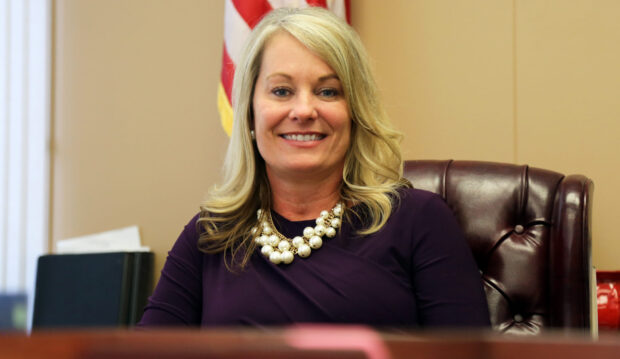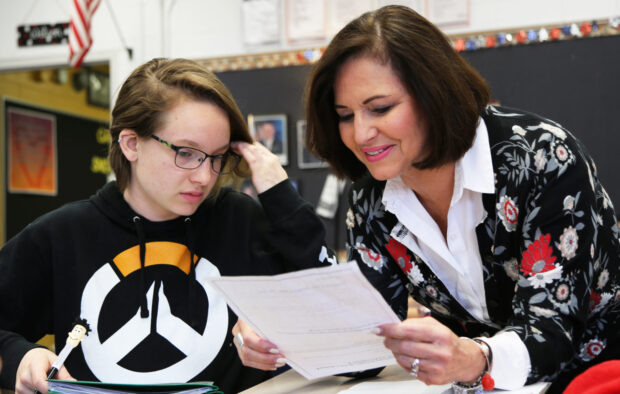If history is any indication, the state superintendent’s race could be the closest statewide contest come Election Day.
Four years ago, Superintendent of Public Instruction Sherri Ybarra came out of nowhere to win by a margin of less than 5,600 votes out of the more than 425,000 ballots cast statewide.
It looks like the stage is set for another barnburner.
This year, Ybarra has kept her head down, and eschewed a traditional campaign in favor of focusing on her day job. Meanwhile, retired teacher and Democratic challenger Cindy Wilson has pounded the pavement and built up a sizable social media following.
The money and the ads are on Wilson’s side.
But are the voters?
Who’s running and where did they come from?
Both Ybarra and Wilson came out of the classroom.
Ybarra grew up as a coal miner’s daughter in West Virginia. Her second-grade teacher, Mrs. Gatts, inspired her to be a teacher. The impression was so significant that everybody from Ybarra’s parents to country singer Brad Paisley, a former classmate, all knew Ybarra was destined to become an educator.

“I wish I had gone to college, and I want better for my kids,” Ybarra remembers her father telling her and her sisters.
Ybarra earned a bachelor’s degree from West Liberty University in West Virginia. Since then, she went on to earn a master’s degree and education specialist degree from the University of Idaho.
Ybarra began her teaching career as a student teacher in West Virginia. She then moved to Idaho, where she worked as a teacher, vice principal, principal and federal programs director in Mountain Home. Today, Ybarra’s son is a senior who attends public school in Mountain Home.
Wilson grew up in the Eastern Idaho town of Preston. While she was in high school, she served as a page in the Idaho Legislature, an experience she credits with inspiring her interest in politics and government.
Wilson began her education career as a substitute teacher in Pierce. She earned a bachelor’s degree from Boise State University. Throughout her 33-year teaching career, she taught in Pierce, Orofino, Shelley, West Ada and Boise. Over the years, she estimated she has taught 4,000 Idaho public school students.
“For all my life, I’ve been teaching students they have to get involved, they have to walk the walk,” Wilson said this spring. “So, I realized that if I really felt that, I needed to jump into this.”
Of the two, Ybarra is the only candidate with administration experience in education, having served as a building principal and at the district office.
But through her role with the Idaho Board of Correction, Wilson developed administrative experience, has worked with large budgets and has gained experience hiring and firing, she said. And Gov. Butch Otter appointed Wilson to his Task Force for Improving Education.
On the issues
Idaho is at a crossroads with education, and it isn’t just one or two issues at the forefront.
The next state superintendent will lead the 135-person staff at the State Department of Education, serve on the State Board of Education and oversee a public school budget that is rapidly approaching $2 billion.
For Ybarra, her top two education issues are rewriting Idaho’s school funding formula and focusing on the teacher shortage, she said during Monday’s final state superintendent debate.
She’s also promoting a $21 million school safety plan, striving to reduce reporting requirements for school districts and positioning herself as a schools chief who wants to support schools, not punish or police them.
As for track record, Ybarra said, “everything is up in education” and her first four-year term justifies voters sending her back for another four. She points out the Legislature increased school funding by about $100 million in each year she is in office — even if the Legislature didn’t embrace her specific budget requests or support her long-proposed, thrice-failed rural schools center.
“Statistics don’t lie,” Ybarra said, “politicians do.”

As for Wilson, her top priorities are improving student achievement, prioritizing teacher recruitment and retention and promoting early childhood education, focusing first on all-day kindergarten.
“We need to make sure our children are ready to read by third grade,” Wilson said.
Two of the issues the candidates have sparred over — school safety and graduation rates — are also two of the top issues in education.
Wilson has criticized Ybarra in the face of flat high school graduation rates. In 2016, Idaho’s graduation rate was 79.66 percent. In 2017, it was 79.67 percent, representing an increase of two students out of a class of 20,000.
“To celebrate a .01 percent increase is leaving behind so many of our students who are struggling and aren’t graduating,” Wilson said, arguing the state should move beyond advanced opportunities and expand career-technical education programs to move the needle. Wilson also accused Ybarra of papering over the fact that 4,000 high school students did not graduate, and that Idaho’s grad rate lags behind the national average.
Ybarra’s message is that graduation rates are on the rise, even if it’s just by “a smidge and a smooch.”
“Our graduation rate is going up and our teachers in Idaho need to be commended for that great work,” Ybarra said. “Any gain we make in public education is to be celebrated.”
The candidates also differ on school security.
Wilson has criticized Ybarra for rolling out her $21 million Keep Idaho Students Safe proposal without first gathering input from major education groups and the Idaho Office of School Safety and Security.
“The first thing that we need to do is not provide these flash-in-the-pan ideas by putting forward initiatives that are not well thought, that don’t have collaboration, that are announced in press releases without real thought,” Wilson said.
Wilson said she would follow the recommendations of the Office of School Safety and Security and wants to focus proactively on students’ mental health.
Ybarra counters Wilson by saying she won’t wait on the sidelines to act on school safety, and that her grant-based KISS program would allow local schools to decide what their school safety needs are.
“I’m appalled, as the mother of a public school student, to hear my opponent lay that responsibility (for school safety) with another organization of the state,” Ybarra said.
On the campaign trail
Wilson retired from teaching after her May primary victory to focus full-time on campaigning. Wilson traveled to all corners of the state, often teaming up with some of her 4,000 former students to save on hotel costs and introduce her to friends and neighbors.
Wilson’s policy was all-encompassing — she accepted meetings with individual Idahoans and larger groups alike through an interactive calendar on her webpage.
Wilson also embraced debates and forums more than Ybarra. At least twice in October, Wilson accepted debate invitations that Ybarra declined — first from the Idaho Falls City Club, and the next week from Idaho Education News.
Wilson built up a social media following boasting 1,700 Facebook followers and 932 Twitter followers. By comparison, Ybarra has 96 Facebook likes, and a dormant, private Twitter account that hasn’t posted since November 2014.
Since her first campaign in 2014, Ybarra has pledged to not behave as a politician or run traditional campaigns — promises she delivered on. Instead of making a big, public campaign push this summer and fall, Ybarra remained quiet and focused on her day job.
When Ybarra did hit the campaign trail for her first, publicly promoted event at an Eagle bar on Oct. 5, the event made headlines for all the wrong reasons. Her event was sponsored by — and Ybarra appeared with — former Mountain Home principal William McCarrel. The Professional Standards Commission, which regulates teacher certification in Idaho, indefinitely suspended McCarrel’s teaching certificate after making multiple allegations of workplace sexual harassment. Ybarra said she was aware of the allegations before agreeing to the campaign event and went anyway because “He was punished for that and he’s still a friend of mine.”
The allegations, which McCarrel never denied or contested, include that he asked a subordinate employee to flash her breasts, whether she posted nude photos online and whether she would be interested in a threesome. Additionally, McCarrel allegedly grabbed another employee from behind by her hair and asked her whether she “liked it rough.”
Wilson is also winning the money game in the runup to Election Day. According to the latest campaign finance reports, Wilson had $51,424 in the bank, while Ybarra had $6,478.
Deep-pocketed third-party donors are also backing Wilson. The National Education Association gave the Idaho Education Association $249,000 for anti-Ybarra ads, while a new group called Our Schools, Our Future is spending $157,840 on pro-Wilson ads.
Ybarra has racked up endorsements from the Republican establishment, including outgoing Gov. Butch Otter, Lt. Gov. Brad Little, former Lt. Gov. and Attorney General David Leroy and several other state officials and GOP lawmakers.
Wilson earned the support of the IEA, an endorsement from the Idaho Press newspaper and even some Republicans and conservatives, including Rexburg Mayor Jerry Merrill, former Idaho Department of Correction Director Kevin Kempf and retired Supreme Court Justice Jim Jones.
Further reading: Idaho Education News senior reporter Kevin Richert crunches the numbers to analyze each candidate’s path to victory on Tuesday.
